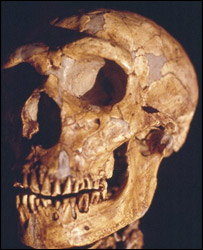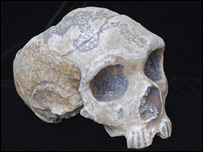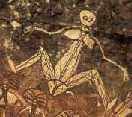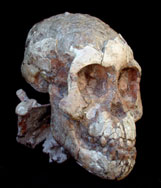|
English Language
|
Pre-history Timeline
The origins of Man and Language
|
3.3
million years ago |
Fossil of Australopithecus afarensis (known as Selam or LIttle Lucy) suggests anatomical adaptations to walking on two legs while also well adapted to living in trees. A unique tongue bone suggests speech was unlikely.
read more at Nature magazine |
"An interesting feature is the hyoid or tongue bone, never found before in a species older than Neanderthal man. It influences the voice box and is important to the debate about the origins of human speech. Selam’s hyoid is much more similar to that of modern apes than humans, suggesting that A. afarensis was not capable of language." Read the rest of the article here. | |
| 500,000-350,000 | Study of ear bones suggest simple speech may have evolved | ||
|
230,000
BC |
Neanderthals evolve. Though there may have been some interbreeding, homo sapiens and nenderthal man are separate species with a common ancestor of homo erectus. View The Evolution of Man (BBC) |
 |
|
|
200,000
BC |
Homo sapiens appears in Africa, descending from Homo erectus | ||
|
40,000
BC |
Homo
sapiens into Europe, Australia Some authorities believe language emerged at this time, in parallel with a surge in the creation of cultural artifacts. It is not likely to have emerged later than this period. |
||
|
35,000
BC |
scattered hunter gatherers begin to create symbols of themselves and their environment | ||
|
28,000
BC |
Neanderthals last known (Gorham's cave, Gibraltar) |  |
|
|
24,000
BC |
Oldest
known carvings Ice ages, mammoth hunting ... |
 |
|
|
23,000
BC |
bird bone flute found from this time suggesting advanced cultural developments | 
|
|
|
15,000
BC |
cave paintings at Lascaux |  |
|
|
10,000
BC |
Asiatics into North America | ||
|
8,000
BC |
Australian cave paintings
Probable first Indo-European speakers in Turkey |
 |
|
| 5000 BC | First writing system - Sumerian script, which develops into cuneiform | ||
|
4000
BC |
Kurgans in steppes of Russia | ||
|
3000-1100
BC |
Egyptian Pharoahs | ||
|
2000
BC |
Phoenicians in Eastern Mediterranean First alphabetic script developed by Semitic workers in Egypt |
||
|
1500
BC |
Oldest surviving Sanskrit texts | ||
|
400
BC |
Celts spread to England | ||
|
55
BC |
Roman military expedition lands in England |
|
|
